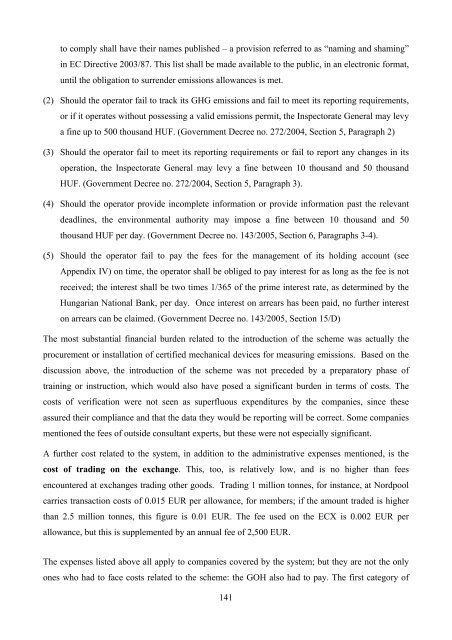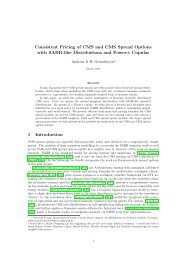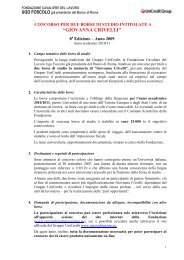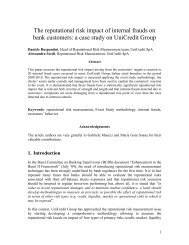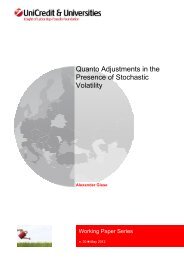Dóra Fazekas Carbon Market Implications for new EU - UniCredit ...
Dóra Fazekas Carbon Market Implications for new EU - UniCredit ...
Dóra Fazekas Carbon Market Implications for new EU - UniCredit ...
Create successful ePaper yourself
Turn your PDF publications into a flip-book with our unique Google optimized e-Paper software.
to comply shall have their names published – a provision referred to as “naming and shaming”<br />
in EC Directive 2003/87. This list shall be made available to the public, in an electronic <strong>for</strong>mat,<br />
until the obligation to surrender emissions allowances is met.<br />
(2) Should the operator fail to track its GHG emissions and fail to meet its reporting requirements,<br />
or if it operates without possessing a valid emissions permit, the Inspectorate General may levy<br />
a fine up to 500 thousand HUF. (Government Decree no. 272/2004, Section 5, Paragraph 2)<br />
(3) Should the operator fail to meet its reporting requirements or fail to report any changes in its<br />
operation, the Inspectorate General may levy a fine between 10 thousand and 50 thousand<br />
HUF. (Government Decree no. 272/2004, Section 5, Paragraph 3).<br />
(4) Should the operator provide incomplete in<strong>for</strong>mation or provide in<strong>for</strong>mation past the relevant<br />
deadlines, the environmental authority may impose a fine between 10 thousand and 50<br />
thousand HUF per day. (Government Decree no. 143/2005, Section 6, Paragraphs 3-4).<br />
(5) Should the operator fail to pay the fees <strong>for</strong> the management of its holding account (see<br />
Appendix IV) on time, the operator shall be obliged to pay interest <strong>for</strong> as long as the fee is not<br />
received; the interest shall be two times 1/365 of the prime interest rate, as determined by the<br />
Hungarian National Bank, per day. Once interest on arrears has been paid, no further interest<br />
on arrears can be claimed. (Government Decree no. 143/2005, Section 15/D)<br />
The most substantial financial burden related to the introduction of the scheme was actually the<br />
procurement or installation of certified mechanical devices <strong>for</strong> measuring emissions. Based on the<br />
discussion above, the introduction of the scheme was not preceded by a preparatory phase of<br />
training or instruction, which would also have posed a significant burden in terms of costs. The<br />
costs of verification were not seen as superfluous expenditures by the companies, since these<br />
assured their compliance and that the data they would be reporting will be correct. Some companies<br />
mentioned the fees of outside consultant experts, but these were not especially significant.<br />
A further cost related to the system, in addition to the administrative expenses mentioned, is the<br />
cost of trading on the exchange. This, too, is relatively low, and is no higher than fees<br />
encountered at exchanges trading other goods. Trading 1 million tonnes, <strong>for</strong> instance, at Nordpool<br />
carries transaction costs of 0.015 <strong>EU</strong>R per allowance, <strong>for</strong> members; if the amount traded is higher<br />
than 2.5 million tonnes, this figure is 0.01 <strong>EU</strong>R. The fee used on the ECX is 0.002 <strong>EU</strong>R per<br />
allowance, but this is supplemented by an annual fee of 2,500 <strong>EU</strong>R.<br />
The expenses listed above all apply to companies covered by the system; but they are not the only<br />
ones who had to face costs related to the scheme: the GOH also had to pay. The first category of<br />
141


